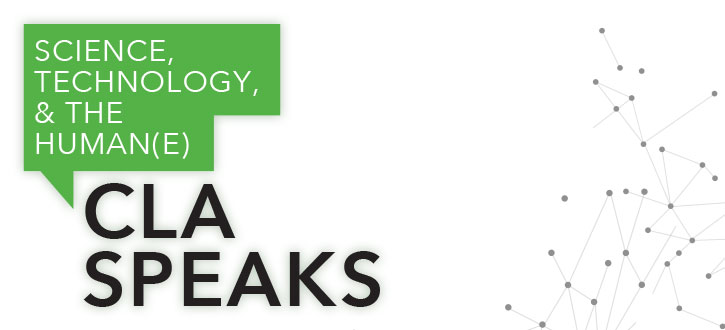CLA Speaks 2015-16: Science, Technology & The Human(e)

Founded in 2015, CLA Speaks is the speaker series for Cal Poly's College of Liberal Arts. Organized around an annual theme, this interdisciplinary series showcases the ways that disciplines in the College of Liberal Arts shape important and meaningful conversations about our world, our cultures, and our imagination.

Immersive Storytelling from the Mad Scientist of Journalism
Robert Hernandez
10 a.m., Friday, March 4,
Bldg. 180, Rm. 107
Journalists and filmmakers praise Virtual Reality for its extraordinary ability to help us see the world as no two-dimensional photograph or film can.
Join Robert Hernandez, the “mad scientist of journalism,” as he explores how the pioneers of V.R. are using this powerful storytelling tool — and experience its impact first-hand.
Find out why some are calling 2016 the Year of Virtual Reality ... why the Sundance Film Festival and The New York Times are excited about V.R. ... and why we need to start experimenting.
April 28

The Contested Public Ethos of the 21st Century Scientist
Leah Ceccarelli
UNIVERSITY OF WASHINGTON
3:10 p.m.
PAC Pavillion
Dr. Leah Ceccarelli will provide an interesting and engaging presentation regarding the public image of scientists in contemporary culture. In her talk, she will discuss some subsequent projects in which she analyzes the way scientists are characterized in the public eye.
She will present three case studies (George W. Bush’s treatment of scientists in his presidential speeches, the persona of the scientist in recent zombie apocalypse movies, and the judicial response to the L’Aquila scientists after the earthquake of 2009) as a demonstration of how the character of the scientist occupies the role of both hero and fool, responsible citizen and morally blind outsider.
Dr. Ceccarelli concludes that a better understanding of the rhetorical possibilities available for representing the ethos of the scientist in contemporary public address can help us to select those depictions that are most likely to benefit society and reject those depictions that are most likely to do harm.
May 5
Why Rhetoric Matters for Ecology: Building Cross-Disciplinary Collaborations for Better Communication, Science, and Decision-Making
Caroline Gottschalk Druschke
UNIVERSITY OF RHODE ISLAND
7 p.m.
Bldg. 22, Rm. 212
Caroline Gottschalk Druschke is an assistant professor of writing and rhetoric and natural resources science at the University of Rhode Island. Working at the intersection of rhetoric and ecology, Druschke’s research and teaching center on public engagement with science, restoration of aquatic ecosystems, transdisciplinary collaboration and science communication.
Druschke has published in leading conservation and communication journals and received funding from the National Science Foundation, National Park Service, U.S. Environmental Protection Agency and AAUW.
May 10
Eggs, Embryos, Women: Technology and the Reproductive Economy
Lisa Ikemoto
UC DAVIS SCHOOL OF LAW
5 p.m.
Advanced Technology Laboratories Lobby (Bldg. 7, Rm. 1)
Martin Luther King, Jr. Professor of Law, Lisa Ikemoto, is a Bioethics Associate of the U.C. Davis Health System Bioethics Program, and a Faculty Associate of the U.C. Davis Center for Science and Innovation Studies. She teaches bioethics, health care law, public health law, reproductive rights, law & policy, and marital property.
Her research areas include reproductive and genetic technology uses, health care disparities, and public health law.
May 12
The Lingering Value of Technological Artifacts
Benjamin Hale
UNIVERSITY OF COLORADO
Thursday, May 12
11 AM — 12:30 PM
Bldg 10 Room 223
Electronic waste is the fastest growing form of waste worldwide. Unfortunately, disposal is not straightforward and recycling is hindered by a tendency of consumers to resist recycling their e-waste. There seems to be no good reason why people hoard these technologies.
They ostensibly have no utility value, no market value, and only arguable sentimental value. This paper aims to address the reasons why we might hold value in our technological artifacts. Answering this question hopefully offers some clarity on how to move forward with more successful e-waste management programs.
May 16
Design as Inquiry and Intervention
Daniela Rosner
SAN FRANSISCO BAY AREA
May 24
The Digital Revolution at 25: How did we get here?
Tom Sito
UNIVERSITY OF SOUTHERN CALIFORNIA
November 16, 2015
Solving Society's Audacious Challenges
Aaron Opdyke
At the United Nations Sustainable Development Summit in September, 193 nations committed to three extraordinary tasks: end extreme poverty, fight inequality and injustice, and address climate change. Opdyke will discuss the need for interdisciplinary teams to solve these pressing societal challenges.
October 22, 2015
Deep Blue
As part of an ongoing collaboration with Cal Poly, Australian music/theatrical performance troupe Deep Blue will visit campus for a series of community events, including a Theremin competition and troupe auditions Oct. 22-23.
Deep Blue is “the orchestra reinvented for the 21st century.” The troupe combines classical music, contemporary music played on stringed instruments, circus tricks (stilt walking, acrobatics and unicycle riding) with electronic instruments and app-managed audience interaction. The troupe also runs the Young Blue series, music education workshops designed for middle school students to develop their musical and performance skills.
October 1, 2015
Bending the Rules of Art and Science
Tim Jenison
Tim Jenison is an inventor featured in the documentary film, "Tim's Vermeer." In the film he works to solve a mystery: how did 17th-century Dutch Master Johannes Vermeer manage to paint so photo-real>istically — 150 years before the invention of photography? Tim Jenison took part in a series of events, including a talk, “Bending the Rules of Art and Science,” a screening of the documentary “Tim’s Vermeer,” and two mash-up events, which brought students from various disciplines together to discover surprising connections/bridges between themselves and their disciplines.